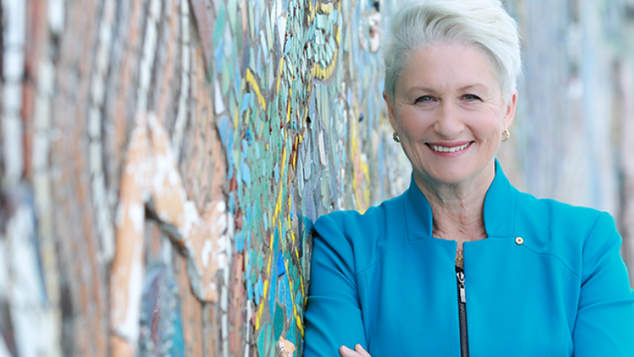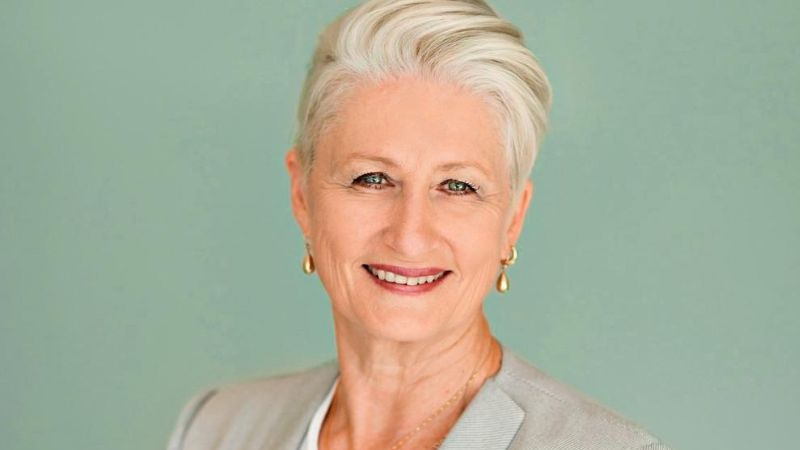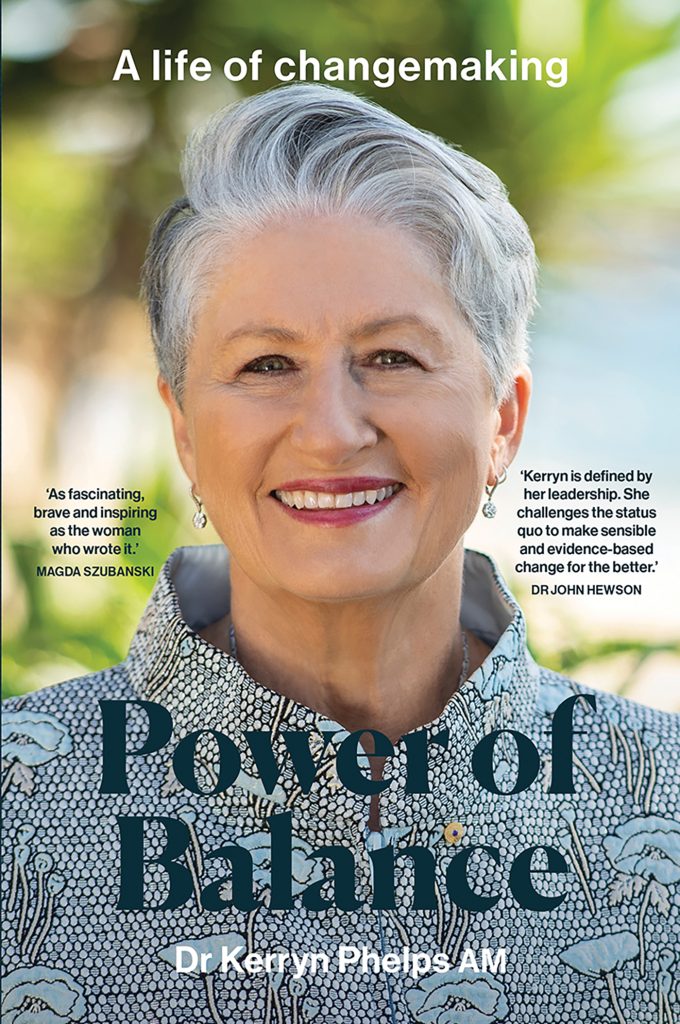EXCLUSIVE
Some may know Dr Kerryn Phelps as a fierce independent member of parliament who fought for better treatment for asylum seekers.
Others will recall her decades in the media speaking about health issues on television, on radio, and in print. So present was Phelps in our lives, many of us saw her more often that our own family doctor.
You may know Phelps for her prominent campaigning for marriage equality, or her ground-breaking appointment as the first female president of the Australian Medical Association.
Kerryn Phelps has filled many different roles in public life, but in her new autobiography Power of Balance: A Life of Changemaking she shares all the different stages in her journey.
From her time growing up in different parts of New South Wales, to establishing her practice as a family GP, to having her privacy ripped away when a newspaper outed as being in a same-sex relationship – Kerryn Phelps takes us into the most personal moments of her life.
At every stage Phelps has been a changemaker, a skilled negotiator and a voice for collaboration, shared understanding and reaching consensus.

Penning recollections of prominent moments in her life; the triumphs, the heartaches, the times of great frustration, and the celebrations of major achievements, saw Phelps looking at old photographs, revisiting archival clippings of newspaper stories and chatting to old friends who were there at the time.
Speaking to OUTinPerth Phelps said the memories came flooding back quickly. Of course, wife Jackie Stricker has been at her side for many of those significant moments. The couple have now been together for over a quarter of a century.
“I think when you’re writing a memoir, you’re really writing it from your own perspective.” Phelps said of the process of writing, noting that others may recall events in a different manner.
The long journey towards marriage equality
One of the biggest stories to share in Power of Balance is Phelps role in the push for Australia to embrace marriage equality.
Today Phelps looks back on her two-decade push for same-sex couples being recognised and describes it as the “civil rights movement of our time”.
In 1993 Phelps was a successful doctor with her own practice, married with a young family, and a significant media profile. But she’d realised that she was gay and unhappy with her situation. She separated from her husband and came out to her family. Her parents didn’t embrace the news.
A few months later she met schoolteacher Jackie Stricker, but it would be a few years before their platonic friendship changed into a romance.
In 1998 the couple were wed in a ceremonial Jewish ceremony in New York, but not long after they returned to Australia a tabloid newspaper splashed news of their relationship and sexuality across its pages.
“It was an extraordinary time. I remember in 1998, when Jackie and I were outed by The Sunday Telegraph. It was it was a risky time for people to come out, and certainly to be outed.” Phelps said.
“It hadn’t happened too many times in Australia…we were in very much in an uncharted territory, we really didn’t know what the implications of that would be.”
Robbed of sharing information about their own lives, family and sexuality, Phelps and Stricker were soon the subject of talkback radio and newspaper columns, but the couple vowed not to be silent, and the dreadful experience just solidified their commitment to advancing LGBTIQA+ rights.
“We started the conversation about marriage equality, about same sex relationships being equally recognised under the law, and that was a conversation that went through from then until 2017.” Phelps said.
“I think people are having conversations about marriage equality in different parts of the world, it’s still sort of rolling out in different countries, but certainly from our perspective, we made a conscious decision to start talking about discrimination, and to start talking about marriage equality as one of those aspects of discrimination, and along the along the way 85 or more federal laws were changed that we didn’t even realise discriminated against us in a whole range of areas.
Looking back on Australia’s slow journey towards marriage equality Phelps questions why it took so long.
“How ridiculous was it that it took so long for our relationships to be recognised as worthy of equal recognition under the law.” Phelps comments, but acknowledges the journey also included a long process for the LGBTIQA+ communities to building a shared understanding of why the issue was important.
“There were different schools of thought about that about whether it was an institution that we wanted to be a part of. And what it came down to then was about having a personal choice about whether you wanted your relationship to be recognised in a particular way.
“Then people started to come on board, we got organised, we all started to speak with one voice towards a common goal. And that’s how we eventually achieved marriage equality. Looking back on it, it was, I think, the civil rights movement of our time.”
Religious Discrimination Legislation
While Australian ultimately overwhelmingly ticket the YES box in the postal survey that led to the government changing the marriage laws, Phelps says it is disappointing the debate over religious discrimination legislation still drags on seven years later.
“One of the things that I found remarkable was that it really came out of the postal survey success, because it was like a consolation prize to the NO campaign that they got to have this right to discriminate, rather than the right to practice personal religion free from discrimination.
“I think we have to keep our radars very finely tuned on this so-called religious discrimination issue.” Phelps said.
The former politician said she appreciated that many different groups and individuals had highlighted all the different concerns about the various bills that have been put forward in recent years.
Phelps said many people had put a lot of “thoughts into what it might mean in terms of discrimination, not only against the LGBT+ community, but also against people who were divorced, or people who came from a minority religious backgrounds, or people with a disability.
“There are so many elements to this, it’s not something that I should think should ever be rushed through Parliament, and it is something that should be viewed with a lot of caution.”
Breaking down barriers
At every stage of her career Dr Phelps has been breaking down barriers for women. When she started her medical career female doctors were few and far between, she was the first female President of the Australian Medical Association, and in politics – the first woman to be the Member for Wentworth.
“It’s amazing that there are still those barriers to be broken down.” Phelps said. “The interesting thing is, when I look back at that time as an intern, and I look back at when I was probably the first female doctor regularly appearing on Australian television, and first female president of the AMA – I wasn’t doing those things to be the first at something, it just so happened that nobody had done those things before.
For Phelps the title of her book Power of Balance has many meanings, it’s about having balance in your life, ensuring representation through a balance of voices and views, and making sure people from all backgrounds are visible in society.

The cross over of medicine and politics
Whether it be sharing medical information on television, negotiating in the parliament, or campaigning for major changes to society, the approach Phelps has taken is a consistent one.
Removing jargon, whether it be medical mumbo-jumbo, legislative speak, or political rhetoric, is central to Phelps approach. Understanding other’s points of views and building understanding is also a constant.
When it comes to getting politicians to understand medical issues, Phelps says there’s a real need for medical practitioners who are skilled in communication, people who can straddle the two worlds.
“It really helps if you have doctors who have some experience in health communication, because in some respects, it’s like translating a foreign language.
“You do have to speak in ways that people who don’t have that medical jargon jargon are able to understand, and by and large, with few exceptions, health ministers are not doctors and don’t have a medical science background.
“They’re coming from a political perspective, it very much helps if you also have a political understanding, because you’ve kind of got to work out what those political triggers might be to get action.
From writing letters, to visiting politicians, getting a group together, or making submissions to inquiries Phelps says there are lots of ways people can influence outcomes. Although the process can be exhausting.
“The way I look at it is that I provide the evidence, I outline the problems, and I always try and find a solution. There’s no point in saying this is a huge problem without saying, well, maybe there’s a solution to this, or a range of solutions.”
Dr Phelps advice might be applied to a range of current issues, from protecting transgender health care, to discriminatory HIV laws, or ensuring that health services are equally available to everyone.

The Power of Balance: A Life of Changemaking by Dr Kerryn Phelps AM is available now from Hardie Grant Books.





